M7 U2 牛津英语 连系动词练习
上海牛津英语Module2Unit7同步验收练习及答案

上海牛津英语Module 2 Unit 7 同步验收练习及答案I. Choose the best answer. (20分)( ) 26. The disabled boy can’t hear ______ speak.A. orB. andC. butD. also( ) 27. We should keep ______ when we listen to a speech.A. quietlyB. quietC. quiteD. noisy( ) 28. I live on the fifteenth floor, I go up and down ______.A. by escalatorB. by liftsC. by the liftD. by the escalator( ) 29. Must we use ______ in the middle?A. oneB. the oneC. firstD. the first( ) 30. Let’s go into the cinema now. Here “go into”means ______.A. entreB. centreC. go onD. go to( ) 31. We mustn’t play ______ football in the street.A. aB. anC. /D. the( ) 32. We must wait ______ the green man when we cross the road.A. atB. inC. forD. on( ) 33. What does this sign ______?A. meansB. meaningC. meanD. to mean( ) 34. —Must I finish my homework today?—No, you ______. Y ou can finish it tomorrow.A. can’tB. needn’tC. mustn’tD. shouldn’t( ) 35. Where ______ we ______ bikes in your school?A. must, parkB. do, must parkC. do, need parkD. have, park( ) 36. There is ______ bread left. Let’s go and buy some.A. a fewB. a littleC. fewD. little( ) 37. Jack is a good boy. He always ______ the environment.A. looks upB. looks forC. looks afterD. looks down( ) 38. —______ do you go to work every day?—On foot.A. HowB. How farC. How oftenD. How long( ) 39. I met my class teacher on my way______ home yesterday.A. toB. inC. /D. on( ) 40. If you want to go upstairs, you should use the lift in the middle. Here, “in the middle”means ______.A. in the centreB. on the leftC. on the rightD. upstairs( ) 41. Don’t ______ flowers in the park.A. pickB. pickingC. pick upD. picking up( ) 42. “No bicycles”means “Y ou ______ ridebicycles here.”A. canB. can’tC. mayD. may not( ) 43. We should follow all the rules ______ us.A. betweenB. nearC. aroundD. next to( ) 44. Look out! The bus is coming! ______ cross the road!A. Don’tB. Can’tC. DoD. Can( ) 45. Students should ______.A. listen to the teachers carefullyB. chase each other in the classroomC. draw on the desksD. play in the classroomII. Complete the sentences with the given words in their proper forms. (5分)46. We can see the sign “______ (enter)”in the supermarket.47. It is the most interesting ______ (advertise) I have ever seen.48. It’s impolite to talk ______ (loud) in public.49. ______ (final), the poor boy was out of danger.50. I want to write some ______ (invite) for my birthday party.III. Rewrite the sentences as required. (10分)51. Turn left, please. (改为否定句)______ turn left.52. We must use the escalator in the middle. (对划线部分提问)______ ______ must we use?53. Mary usually goes shopping with her aunt. (对划线部分提问)______ does Mary usually ______ with her aunt?54. I see some restaurants on my way to school. (同义句转换)I see ______ ______ restaurants on my way to school.55. Don’t talk loudly. (同义句转换)______ ______ talk loudly.I. Reading comprehension. (31分)A★This is a special class. The students come from different countries. Some come from America, others come from Canada, Japan, Australia and England. They speak different languages. But all of them can speak English. They are good friends. They study together, play together and live together, they help each other.All the teachers of this class are Chinese, but they can speak English. They teach their students inEnglish. They are very kind and friendly. They work hard. The students in this class study Chinese cooking and Chinese Kung fu. All the students like China. They say China is a great country and Chinese people are friendly. And they are happy in China.True or false. (5分)( ) 56. The students all come from England.( ) 57. All of them speak the same language.( ) 58. The teachers of this class teach the stu-dents in English.( ) 59. The students in this class only study cooking.( ) 60. The students like China because they think China is a great country and Chinese people are friendly.B ★★Jack and Eddie have a lot to do at weekends. Every Friday afternoon they do their homework. Every Friday night they go to a party. They dance and sing there, then they go home.On Saturday mornings during the winter, Jack has band practice, and Eddie plays on the football team. In summer they go to the park and play basketball. Sometimes they go to the beach. There they swim and lie in the sun. On Saturday nights they go to a movie or disco with their friends. On Sundays they go to museums, or go skating. In summer they also spend Sundays in the park or at the beach. They like the fresh air there. Sometimes they visit their relatives in other parts of the city. On Sunday evenings they do their homework and they get things ready for school the next day. Jack and Eddie like the city, and they always have a good time at weekends.Choose the right answer. (5分)( ) 61. Jack and Eddie are ______.A. father and sonB. mother and daughterC. school boysD. school teachers( ) 62. They both like ______ in summer.A. playing footballB. swimmingC. runningD. driving( ) 63. ______ they do their homework.A. Every Friday afternoon and every Sunday eveningB. Every Friday evening and every Sunday afternoonC. On Friday afternoon and Sunday afternoonD. On Friday evening and every Sunday evening( ) 64. On Sundays they sometimes visit their relatives ______.A. in the same cityB. in the countrysideC. in different citiesD. on the hills( ) 65. Which of the following is NOT true according to the passage?A. They go to school on weekdays.B. Both of them like fresh air.C. Every Friday night they go to a party to dance and sing.D. They don’t have a good time at weekends.C ★★★A traveller came out of the airport. There were a lot of taxis. He asked every taxi-driver’s name.Then he took the third one. It cost $5 to go from the airport to the hotel. “How much does it cost to hire (雇请) you for the whole day?”The man asked. “$100,” said the taxi-driver. This was very dear, but the man said it was OK. The taxi-driver took the man everywhere. He showed him all the parks and museums in the city. In the evening they went back to the hotel. The traveller gave the taxi-driver $100 and said, “What about tomorrow?”the taxi-driver looked at the man and said, “Tomorrow? That will be another $100.”But the man said, “That’s OK! See you tomorrow.”The taxi-driver was very happy to be getting more money.The next day the taxi-driver took the tra-veller everywhere again. They visited the same parks and museums. In the evening they went back to the hotel. The man gave the taxi-driver $100. But the taxi-driver felt guilty (内疚的) because he liked the traveller and $100 a day was a lot of money. “So you are going home. Where do you come from?” he asked. “I come from New Y ork.” “New Y ork!” said the driver. “I have a sister in New Y ork. Her name is Susan. Do you know her?” “She gave me $200 to give you.”Answer the questions. (10分)66. Where did the traveller come from?__ ________________________________67. How many taxi-driver’s names did the tra-veller ask?__ ________________________________68. Who asked the traveller to give the money to the taxi-driver?__ ________________________________69. Did the taxi-driver get a lot of money?__ ________________________________70. How would the taxi-driver probably feel after the traveller told him the truth?__ ________________________________D ★★Choose the words or expressions and complete the passage. (5分)Bill is a student in Junior One. His father, Mr Smith, is a doctor. His mother, Mrs Smith is a nurse. Both of his cousins are __71__. His sister, Alice is studying __72__ No. 1 Junior High School. Alice and Billy often do __73__ homework together. Alice can help Bill __74__ his lessons. Last weekend __75__ went to the cinema. They saw the film “Transformers”. They enjoyed the film very much.( ) 71. A. postman B. engineerC. teachersD. a worker( ) 72. A. at B. of C. with D. to( ) 73. A. his B. them C. they D. their( ) 74. A. on B. / C. with D. to( ) 75. A. Smiths B. the SmithsC. SmithD. the SmithE ★★Read the passage and fill in the blanks with proper words. (6分)Every day, we go to school and go home by bus, by bicycle or on foot. It is important for us to follow the safety rules.1. If you take a school bus:★Be early. Arrive at the bus stop 5 minutes before the bus is due (预定的).★Line up. W__76__ until the bus stops and the door opens.★Don’t leave anything on the bus.★If you drops something near or under the bus, don’t p__77__ it up. Tell the driver first.★Don’t talk l__78__ on the bus.2. If you ride a bicycle:★Check all parts to make sure they are working w__79__.★See and be seen. Wear clothes that make you more visible (明显的).3. If you walk to school:★Always walk on the sidewalk. If there is no sidewalk, walk o__80__ the side of the road facing the traffic, so you can see any cars coming at you.★Cross only at corners or crossroads. Look left, then right, then left again before you cross.★Don’t run onto the road from between parked cars.★Don’t chase (追逐) on the road, it is too d__81__.76. ______ 77. ______ 78. ______79. ______ 80. ______ 81. ______II. Writing. (9分)Write at least 50 words on the topic “Library Rules”.Library RulesModule 2 Unit 7 同步验收练习参考答案Part 1 听力部分录音原文及参考答案:I. 1. Don’t walk on the grass in the park.2. We must not run across the road when the red light is on.3. We must not pick the flowers in the park.4. It’s dangerous to climb the tree.5. Don’t leave rubbish everywhere.6. We can use the escalator to go upstairs.(1—6 CDFAEB)II. 7. W: Y ou mustn’t smoke here!M: Why not?W: There’s a sign which says “No Smoking”.Q: Why can’t the man smoke here?8. W: Y ou mustn’t drink that milk!M: Why not?W: It’s not fresh.Q: Why can’t the boy drink the milk?9. W: Excuse me, sir.M: Y es? Anything wrong?W: Y our shoes! Y ou mustn’t wear the shoes like these in the club.M: Oh. Sorry, I forgot.Q: Where are they now?10. W: Look out!M: Pardon?W: Y ou’d better not feed the pandas.M: Why?W: Because she might fall ill, and you’ll be fined.M: Thanks for telling me.Q: What animals are they talking about?11. W: Don’t touch that pot!M: What did you say?W: I asked you not to touch that pot.M: Why?W: It’s hot. It’ll burn you!Q: Why did the woman ask the boy not to touch the pot?12. W: Take care!M: Don’t worry, Mum.W: Be sure not to run far away from home.M: I won’t, Mum.W: Bye.Q: What does the mother ask her son to do?13. W: Hey, young man. Don’t be so noisy. Mind what you’re doing.M: I’m trying to be helpful, madam.W: Y ou’re bothering others. Y ou’d better get back and mind your own business.M: Y es, madam.Q: What is the young man doing?14. W: Do you smoke?M: Y es, but not often.W: I think you’d better give it up. It’s bad for your health.M: I will take your advice and stop smoking from today on. Thank you.Q: What does the man decide to do?(7—10 ADCB 11—14 BDCA)III. Today my father came back from the USA. He told me some customs of Americans. When an American friend asks you to have dinner, he usually invites you a week in advance. The dinner is usually served at home. Y ou should get there on time, and don’t forget to wear nice clothes. When you are at dinner, you should observe some customs:A. Don’t leave bones on the table or on the floor.B. Don’t talk with much food in your mouth.C. Don’t ask others to have more wine.D. After dinner, use your napkin to clean your mouth and hands.Next day, you’d better call your friend to thank him for the good dinner.(15—20 TFTFFT)IV. M: Susan, this is my first visit in this city. Could you give me some advice?W: All right. The first thing is to make sure that you don’t smoke in public places. Smoking is not allowed in the public.M: OK. What else should I pay attention to?W: Don’t drive faster than the speed limit. Or the police will give you a fine.M: What’s the speed limit?W: They are not the same. But it’s 30 km per hour on most roads. Also, don’t run across the road when the red light is on.M: No problem. I never break traffic rules.W: Y ou also have to watch out for pickpockets in the shopping centre. There’re quite a lot of thieves in this city.M: Really? Anything else?W: Maybe you’ve seen the notices on those yellow signboards. They warn people not to spit or litter.(21. public 22. drive 23. red light 24. thieves 25. yellow)Part 2I. 26—30 ABABA 31—35 CCCBA 36—40 DCACA 41—45 ABCAAII. 46. entrance 47. advertisement 48. loudly 49. Finally 50. invitationsIII. 51. Don’t 52. Which escalator 53. What, do 54. a few 55. Y ou mustn’tPart 3I. A. 56—60 FFTFTB. 61—65 CBAADC. 66. He comes from New Y ork. 67. Three. / 3. 68. The taxi driver’s sister. 69. No, he didn’t. 70. Unhappy. (Any reasonable answers.)D. 71—75 CADCBE. 76. Wait 77. pick 78. loudly 79. well 80. on 81. dangerousII. One possible version:Library RulesWe have some library rules at school. We must take our student cards with ourselves to enter the library and borrow books. We must keep quiet in the library. We may keep the borrowed books for two weeks. We can’t talk loudly in the reading room. We can ask the library assistants for help whenever we have a problem. We must turn off the ring tone of our mobile phones before we enter the library.。
英语译林牛津版选修7Unit2学案(短语动词练习及答案).docx
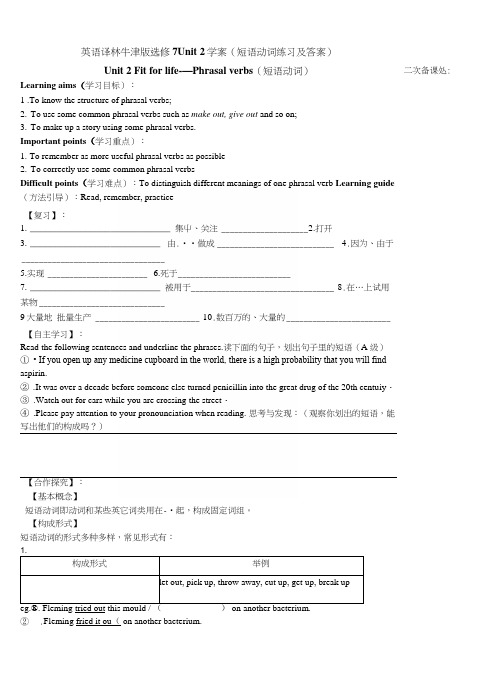
英语译林牛津版选修7Unit 2学案(短语动词练习及答案)Unit 2 Fit for life-—Phrasal verbs(短语动词)二次备课处: Learning aims(学习目标):1 .To know the structure of phrasal verbs;2.To use some common phrasal verbs such as make out, give out and so on;3.To make up a story using some phrasal verbs.Important points(学习重点):1.To remember as more useful phrasal verbs as possible2.To correctly use some common phrasal verbsDifficult points(学习难点):To distinguish different meanings of one phrasal verb Learning guide(方法引导):Read, remember, practice【复习】:1. ____________________________ 集屮、关注 ____________________2.打开3. __________________________ 由.••做成___________________________4.因为、由于_________________________________5.实现 _______________________6.死于__________________________7. __________________________ 被用于_________________________________ 8.在…上试用某物_____________________________9大量地批量生产 ________________________ 10.数百万的、大量的________________________【自主学习】:Read the following sentences and underline the phrases.读下面的句子,划出句子里的短语(A 级)①• If you open up any medicine cupboard in the world, there is a high probability that you will findaspirin.②.It was over a decade before someone else turned penicillin into the great drug of the 20th centuiy・③.Watch out for cars while you are crossing the street・④.Please pay attention to your pronounciation when reading. 思考与发现:(观察你划出的短语,能写出他们的构成吗?)【合作探究】:【基本概念】短语动词即动词和某些英它词类用在-•起,构成固定词组。
牛津上海版英语七年级上册unit2基础知识练习题
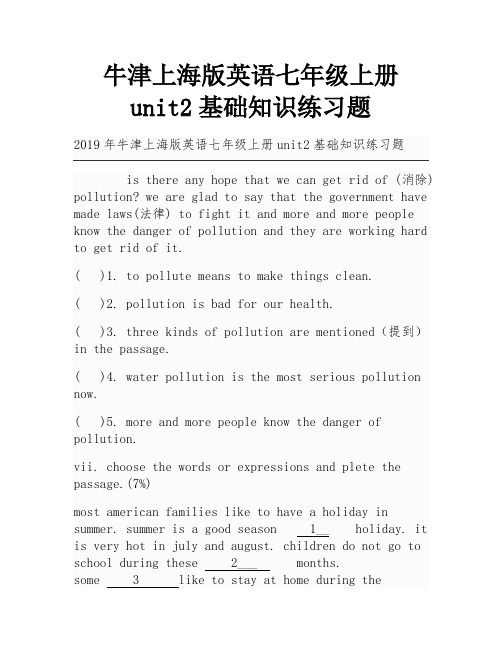
牛津上海版英语七年级上册unit2基础知识练习题is there any hope that we can get rid of (消除) pollution? we are glad to say that the government have made laws(法律) to fight it and more and more people know the danger of pollution and they are working hard to get rid of it.( )1. to pollute means to make things clean.( )2. pollution is bad for our health.( )3. three kinds of pollution are mentioned(提到)in the passage.( )4. water pollution is the most serious pollution now.( )5. more and more people know the danger of pollution.vii. choose the words or expressions and plete the passage.(7%)most american families like to have a holiday in summer. summer is a good season 1__ holiday. it is very hot in july and august. children do not go to school during these 2___ months.some 3 like to stay at home during theholiday. they work in the garden, visit friends, read books, or watch tv. many families 4__ their lunch to a park or somewhere far from the city. they like to eat where there are many trees or there is a nice lake. if they live near the 5 , they often go to the beach. they can fish, swim or enjoy the sun there. america is a large country. many familiestravel by 6 or by train to see interesting places. they also travel by plane to a foreign country. many big cities have many famous buildings, theatres, shops and other places 7 travellers.( )1. a. to b. of c. for d. about( )2. a. two b. threec. fourd. five( )3. a. peopleb. studentsc. man d. woman( )4. a. give b. have c.make d. take( )5. a. city b. town c.village d. sea( )6. a. car b. a carc. their car d. cars( )7. a. inb. for c. on d. atvii. read the passage and fill in the blanks with proper words. (5%)do you know which c is the biggest in china? it’s shanghai. it’s 1,780 kilometres fromguangzhou to shanghai. if you travel by air, you’ll find it very i and fast enough to fly from guangzhou to shanghai. it onlyt you about 3 hours and you’ll get there easily, safely and unhurriedly (从容不迫地).but travelling by train is quite d __ . you have to stay on the train over thirty hours to arrive in shanghai. more and more people like to travel by a____. you can see why, can’t you?viii. writing (作文) :(8%)write a passage of at least 5 sentences about thetopic “my holiday plan for national day”use the following points as a reference.1. what would you like to do on national day?2. which place do you plan to visit?3. how will you go there? why?4. who will go with you?。
牛津上海版七年级英语上册Unit2基础知识及语法归纳练习
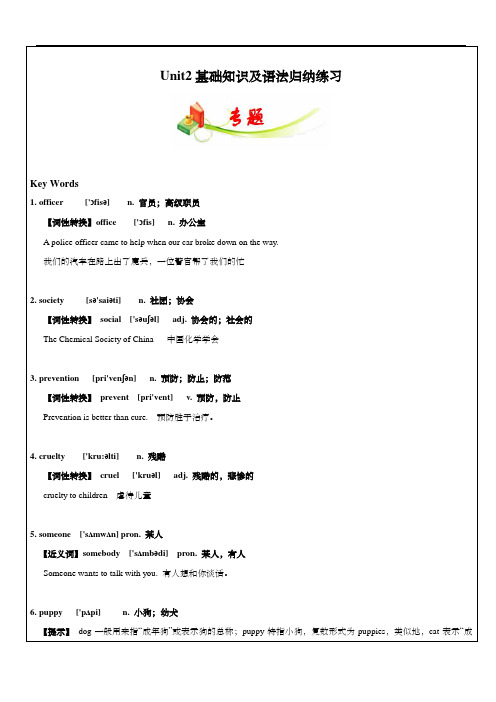
Unit2基础知识及语法归纳练习Key Words1. officer ['ɔfisə] n. 官员;高级职员【词性转换】office ['ɔfis] n. 办公室A police officer came to help when our car broke down on the way.我们的汽车在路上出了魔兵,一位警官帮了我们的忙2. society [sə'saiəti] n. 社团;协会【词性转换】social ['səuʃəl] adj. 协会的;社会的The Chemical Society of China 中国化学学会3. prevention [pri'venʃən] n. 预防;防止;防范【词性转换】prevent [pri'vent] v. 预防,防止Prevention is better than cure. 预防胜于治疗。
4. cruelty ['kru:əlti] n. 残酷【词性转换】cruel ['kruəl] adj. 残酷的,悲惨的cruelty to children 虐待儿童5. someone ['sʌmwʌn] pron. 某人【近义词】somebody ['sʌmbədi] pron. 某人,有人Someone wants to talk with you. 有人想和你谈话。
6. puppy ['pʌpi] n. 小狗;幼犬【提示】dog一般用来指“成年狗”或表示狗的总称;puppy特指小狗,复数形式为puppies,类似地,cat表示“成take care of 照看;照料;照顾(=look after)be unkind to 对……不友善的be kind to 对……友善的save…from… 挽救……以免于……keep…from… 保护;使免受play with sb. 跟某人玩耍help sb. (to) do sth 帮某人做某事on the farm 在农场上Grammar1. 一般过去时:★一般过去时的构成:一般过去时用动词的过去式表示,动词的过去式有规则与不规则两种。
牛津新版2019年秋七年级英语上册Unit 2词汇与语法基础训练附答案
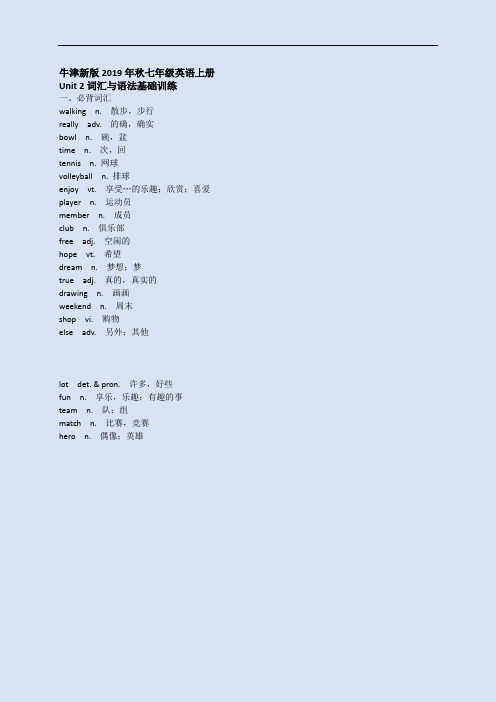
牛津新版2019年秋七年级英语上册Unit 2词汇与语法基础训练一、必背词汇walking n. 散步,步行really adv. 的确,确实bowl n. 碗,盆time n. 次,回tennis n. 网球volleyball n. 排球enjoy vt. 享受…的乐趣;欣赏;喜爱player n. 运动员member n. 成员club n. 俱乐部free adj. 空闲的hope vt. 希望dream n. 梦想;梦true adj. 真的,真实的drawing n. 画画weekend n. 周末shop vi. 购物else adv. 另外;其他lot det. & pron. 许多,好些fun n. 享乐,乐趣;有趣的事team n. 队;组match n. 比赛,竞赛hero n. 偶像;英雄二、重点词汇1. enjoy verb /ɪnˈdʒɔɪ/to get pleasure from something享受…的乐趣;喜爱;欣赏例句:I really enjoyed that movie.我真的很喜欢那部电影。
I want to travel because I enjoy meeting people and seeing new places.我想去旅游,因为我愿意结识不同的人,见识没去过的地方。
2. free adjective /friː/1). not limited or controlled自由的(地);无拘束的(地)例句:Am I free to leave now?现在我可以离开了吗?I'll give you a key, so you'll be free to come and go as you like.我会给你一把钥匙,这样你就可以自由进出了。
2). costing nothing, or not needing to be paid for免费的(地)例句:I got some free cinema tickets.我搞到了一些免费电影票。
M7U2语法复习+巩固练习-2023-2024学年六年级英语上册单元速记巧练(外研版三起)
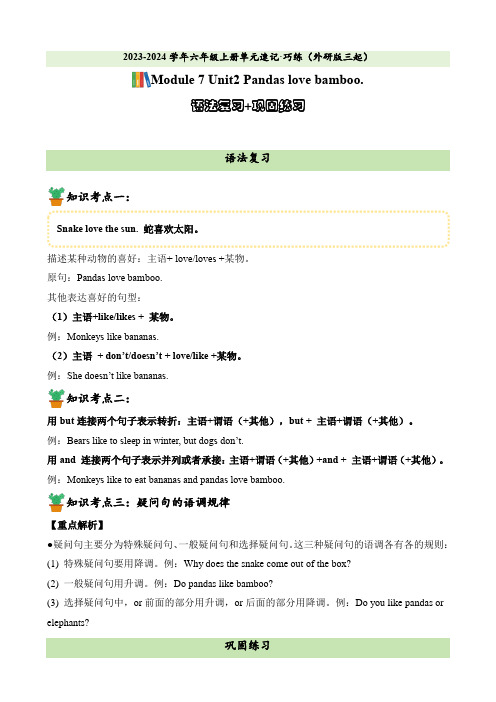
2023-2024学年六年级上册单元速记·巧练(外研版三起)Module 7 Unit2 Pandas love bamboo.语法复习+巩固练习语法复习知识考点一:Snake love the sun. 蛇喜欢太阳。
描述某种动物的喜好:主语+ love/loves +某物。
原句:Pandas love bamboo.其他表达喜好的句型:(1)主语+like/likes + 某物。
例:Monkeys like bananas.(2)主语+ don’t/doesn’t + love/like +某物。
例:She doesn’t like bananas.知识考点二:用but连接两个句子表示转折:主语+谓语(+其他),but + 主语+谓语(+其他)。
例:Bears like to sleep in winter, but dogs don’t.用and 连接两个句子表示并列或者承接:主语+谓语(+其他)+and + 主语+谓语(+其他)。
例:Monkeys like to eat bananas and pandas love bamboo.知识考点三:疑问句的语调规律【重点解析】●疑问句主要分为特殊疑问句、一般疑问句和选择疑问句。
这三种疑问句的语调各有各的规则:(1) 特殊疑问句要用降调。
例:Why does the snake come out of the box?(2) 一般疑问句用升调。
例:Do pandas like bamboo?(3) 选择疑问句中,or前面的部分用升调,or后面的部分用降调。
例:Do you like pandas or elephants?巩固练习一、按要求写单词。
二、单选题。
( )7.A baby sleeps _______ sixteen hours a day.A.in B.for C.to( )8.Monkeys love _______ trees.A.climbing B.climb C.climbed ( )9.—Does she live in Beijing?—_______.A.Yes, she does.B.Yes, she do.C.Yes, I do. ( )10.What _______ it say?A.do B.does C.did ( )11.—Do you love bananas?—_______.A.No, I didn’t B.No, I don’t C.Yes, I don’t ( )12.I can learn a lot_________these stories.A.in B.on C.from ( )13.Dogs like________with children.A.plays B.play C.playing ( )14.The girl gets___________.A.angrily B.anger C.angry ( )15.Snakes_________the flute is dangerous.A.thinks B.thinking C.think ( )16.It usually snows here_______winter.A.in B.from C.at 三、用单词正确形式填空。
Unit7-2023-2024学年七年级英语上册单元速记巧练(牛津)2
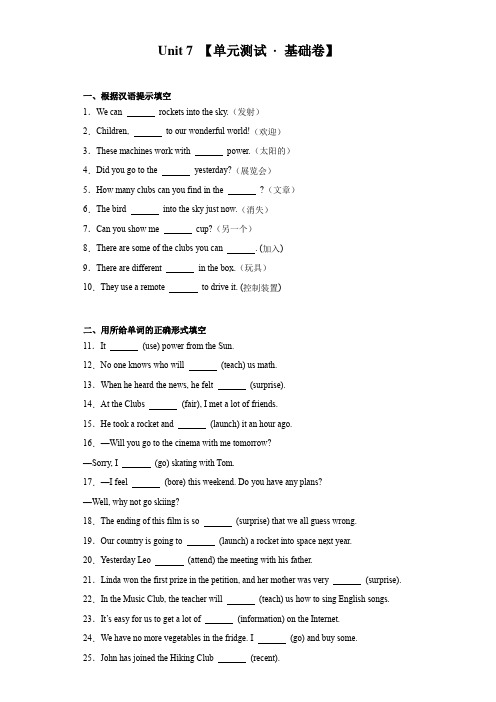
Unit 7 【单元测试·基础卷】一、根据汉语提示填空二、用所给单词的正确形式填空三、单项选择29.—Don't you like my mother?—Of course I do!A.Sure B.Sometimes C.So30.—What happened in your home town?—There were a lot of changes in my home town in recent years.A.in the future B.in many years C.in the past few years 31.—Could you see the plane?—No. The plane disappeared in the sky.A.was out of sight B.showed up C.went32.—What do you think of the news?—It is very amazing. I like it.A.bad B.bad and surprising C.good and surprising 33.—How can I learn the new words well?—You can look up these new words in your dictionary.A.look at the pictures of B.provide information for C.look for information about34.—Where did you first learn about this program?—My teacher told me about it.A.know about B.talk about C.think about 35.—You look so tired.—Right. I just walked here all the way from my home.A.all along B.all in all C.in the way 36.—Will Mr. White attend the meeting to be held at the end of this month?—Sorry, I don't know.A.put off B.give up C.go to37.—Did you have a good time yesterday?—Yes, when I got home, I was ________ to find that they prepared a birthday party for me.A.surprised B.unhappy C.sad38.Solar ________ is a new kind of source of energy and it pollutes nothing at all.A.light B.power C.ability39.—How can I get more ________ about your club?—Well, you can search on the Internet or email to us.A.notes B.signs C.information 40.—Do you often ________ the new words in the dictionary?—Yes. And I find it is good for my reading.A.look at B.look up C.look after 41.—Who arrived late for class this morning?— .A.Li Lei is B.Gina did C.Tony does D.Bill was 42.—_____ did your brother _____ a letter to?—His friend in France.A.Who; wrote B.What; wrote C.Who; write D.What; write 43.If you say that someone or something _____, you mean that you can no longer see them.A.disappears B.protects C.pollutesA.look at the pictures of B.provide information for C.look for information about45.— Do you like your family?— Of course I do!A.Sure B.Sometimes C.SoA.be out of sight B.be seen C.be heardA.arrived in B.returned C.went toA.not amazing B.surprising C.not interestingA.makes B.shows C.watchesA.borrowed B.left C.returnedA.something used to control a thingB.something used to begin a thingC.something used to set up a thing四、完成句子五、汉译英:整句67.我妈妈让我放学后做作业。
(整理版高中英语)同步基础训练(M7U2)
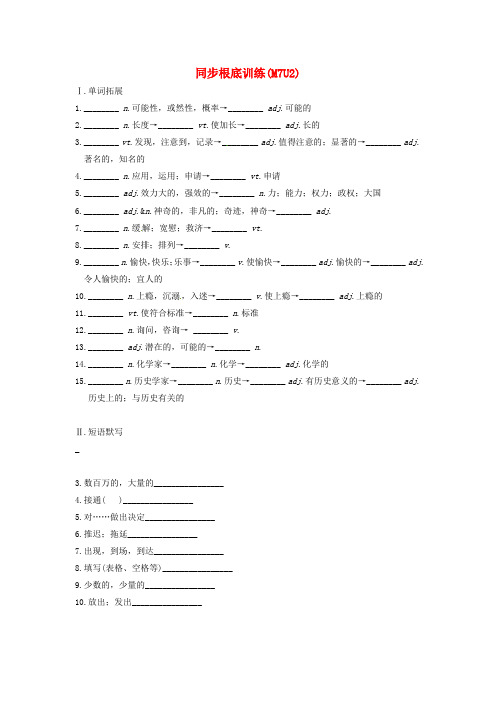
同步根底训练(M7U2)Ⅰ.单词拓展1.________ n.可能性,或然性,概率→________ adj.可能的2.________ n.长度→________ vt.使加长→________ adj.长的3.________ vt.发现,注意到,记录→________ adj.值得注意的;显著的→________ adj.著名的,知名的4.________ n.应用,运用;申请→________ vt.申请5.________ adj.效力大的,强效的→________ n.力;能力;权力;政权;大国6.________ adj.&n.神奇的,非凡的;奇迹,神奇→________ adj.7.________ n.缓解;宽慰;救济→________ vt.8.________ n.安排;排列→________ v.9.________ n.愉快,快乐;乐事→________ v.使愉快→________ adj.愉快的→________ adj.令人愉快的;宜人的10.________ n.上瘾,沉溺,入迷→________ v.使上瘾→________ adj.上瘾的11.________ vt.使符合标准→________ n.标准12.________ n.询问,咨询→ ________ v.13.________ adj.潜在的,可能的→________ n.14.________ n.化学家→________ n.化学→________ adj.化学的15.________ n.历史学家→________ n.历史→________ adj.有历史意义的→________ adj.历史上的;与历史有关的Ⅱ.短语默写_3.数百万的,大量的________________4.接通( )________________5.对……做出决定________________6.推迟;拖延________________7.出现,到场,到达________________8.填写(表格、空格等)________________9.少数的,少量的________________10.放出;发出________________Ⅲ.句子翻译1.The first trials of this medicine took place in 1899 when the company Hoffmann worked for began giving the medicine in powder form to physicians to use with patients.(page 18,lines 13~15)________________________________________________________________________2.He named the chemical found in the mould ‘penicillin’ and tried to make it pure to be a medicine,but was unable to do that.(page 19,lines 44~45)________________________________________________________________________3.So,although Fleming discovered penicillin,it was over a decade before someone else turned penicillin into the great drug of the 20th century.(page 19,lines 54~56)________________________________________________________________________4.弗莱明将这种霉在另一种细菌上进行了试验,结果发现它也杀死了那种细菌。
牛津译林版七年级下英语第二单元动词练习卷
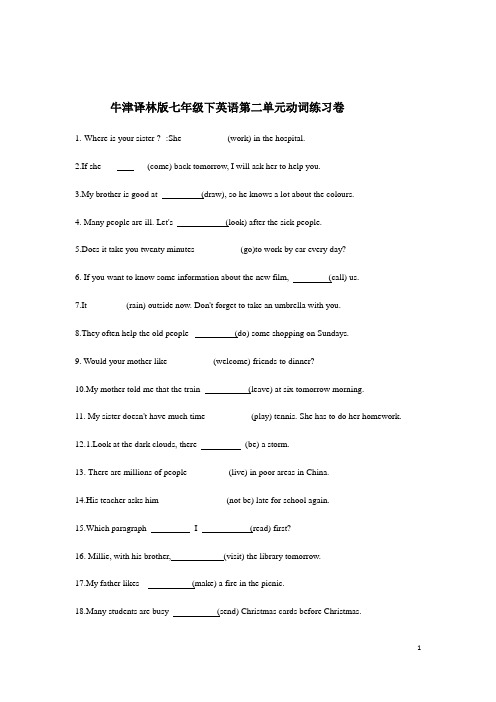
牛津译林版七年级下英语第二单元动词练习卷1.-Where is your sister ? -:She __________(work) in the hospital.2.If she ___ ___(come) back tomorrow, I will ask her to help you.3.My brother is good at (draw), so he knows a lot about the colours.4. Many people are ill. Let's (look) after the sick people.5.Does it take you twenty minutes__________ (go)to work by car every day?6. If you want to know some information about the new film, (call) us.7.It_________(rain) outside now. Don't forget to take an umbrella with you.8.They often help the old people _ (do) some shopping on Sundays.9. Would your mother like __________(welcome) friends to dinner?10.My mother told me that the train (leave) at six tomorrow morning.11. My sister doesn't have much time__________ (play) tennis. She has to do her homework.12.1.Look at the dark clouds, there (be) a storm.13. There are millions of people_________ (live) in poor areas in China.14.His teacher asks him _______________(not be) late for school again.15.Which paragraph I (read) first?16. Millie, with his brother, (visit) the library tomorrow.17.My father likes (make) a fire in the picnic.18.Many students are busy (send) Christmas cards before Christmas.19. (not, worry) about your son. we can look after him well.20.Their teacher (ask) them to check their homework by themselves.21.We are lucky (live) in a neighbourhood like this.22.My aunt (look) after her sick daughter these days..23.My father is good at (swim). He thinks it’s good for his health.24. The bus (leave) just now. I'm afraid you need to wait for the next one.25.Let you and me__________ (be) good friends.26. It's useful (have) a dictionary when you want to learn English.27. My twin sister, like my mother, _(like)to help our neighbors with problems.28. If there is a rain tomorrow, we (stay) at home and study online.29. your brother (watch) TV this evening?30. My sister, like her friends, ____________(plan) to go to the USA these days.31.All the students (get) ready for the coming sports meeting.32. Tom (not,live) near his school, so he has to go to school by bus.33.I'm very lucky (have) a friend like her.34.I think the story__________ (sound) very funny。
精品牛津7AU2知识点总结和练习(含答案).doc
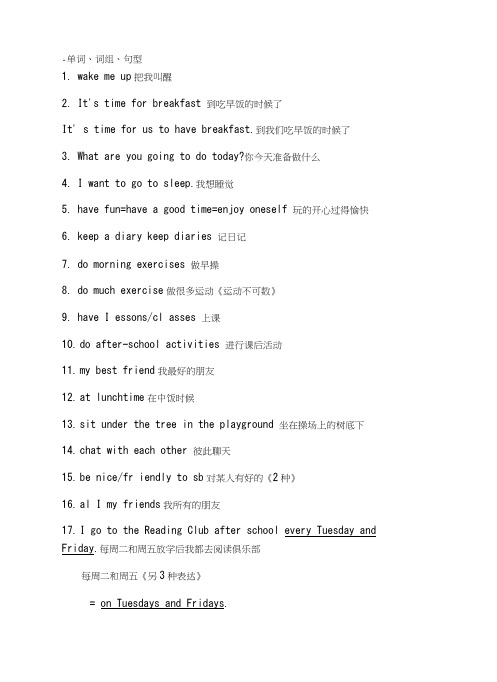
-单词、词组、句型1.wake me up把我叫醒2.It's time for breakfast 到吃早饭的时候了It' s time for us to have breakfast.到我们吃早饭的时候了3.What are you going to do today?你今天准备做什么4.I want to go to sleep.我想睡觉5.have fun=have a good time=enjoy oneself 玩的开心过得愉快6.keep a diary keep diaries 记日记7.do morning exercises 做早操8.do much exercise做很多运动《运动不可数》9.have I essons/cl asses 上课10.do after-school activities 进行课后活动11.my best friend我最好的朋友12.at lunchtime在中饭时候13.sit under the tree in the playground 坐在操场上的树底下14.chat with each other 彼此聊天15.be nice/fr iendly to sb对某人有好的《2种》16.al I my friends我所有的朋友17.I go to the Reading Club after school every Tuesday and Friday.每周二和周五放学后我都去阅读俱乐部每周二和周五《另3种表达》= on Tuesdays and Fridays.=twice a week.=two days a week.(用什么提问》how often19. 我最喜欢的课是语文和英语My favourite lessons are Chinese and English・=I I ike Chinese and English best・20.I spend about two hours a day doing my homework・我一天花大约2小时做我的家庭作业21.I also I ike playing vol leybal I・我也喜欢打排球(2 种》=I I ike playing volleyball, too.22.Amy is a very good swimmer・ Amy 擅长游泳《5 种》= Amy is good/clever at swimming・=Amy does we I I in swimming.=Amy swims we I I・23.practise doing sth with sth 和某人练习做某事24.Amy是游泳俱乐部一员《2种》Amy is a member of the Swimming Club・=Amy is in the Swimming Club.25.e-ma i I me =wr ite/send an emai I to me 写/发邮件给我(3 种》26.I i sten to the radio/her听收音机/听她的(宾格》27.read newspapers 看报纸28.Peter and I both love footbaI I 彼得和我都喜欢足球29.My parents are both doctors.我的父母都是医生30.We play t ogether all the time 我们一直一起玩31.make model planes制作飞机模型32.watch footbaI I matches on TV在电视上看足球比赛33.watch too much TV 看太多电视对too much 提问用(how much)34.be busy (in) doing homework 忙于做作业35.be busy with homework 忙于作业36.know about the匹些(不可数)了解这个新闻37.know a lot about computers 对电脑了解很多38・meet up with sb约见某人去上她的舞蹈课40.teach us English 教我们英语39.go to her dancing lesson41.She does not have much time to talk with her friends.她没有很多时间和她的朋友聊天42. get some informal ion (不可数)about…得到一些关于的信息43.say hello to her《宾格》向她问好44.go on a school trip = have a school trip 进行一次学校旅行45.next Monday 下周一46.Each (=every) student can spend ¥ 10.每个学生可以花10 元47・ Thank you for organizing the class trip.谢谢你组织这次班级旅行48.wouId I ike to do sth=want to do sth 想要做某事《2 种〉49.The price for each student is ¥5. 每个学生的票价是5 元50.The price is too high. (low).价格太高或太低51.The t icket i s expens ive/cheap.票太贵或便宜52.票价格是多少(2种)What, s the price of the ticket?How much is the ticket?53.The zoo is open from 7:30a. m. to 5:00p. m.动物园从早上7点到下午5点开放—54.The shop is closed on Mondays 商店周一关门55.We are al I Iooking forward to a great day out! (look forward to+ doing/n・)我们都期盼出去好好玩一天生你认为你的新学校如何《2种》What do you think of your new school?二How do you Ii ke your new schooI?57.不要担心。
牛津译林版高中英语选修七高二英语:M7练习U1grammar
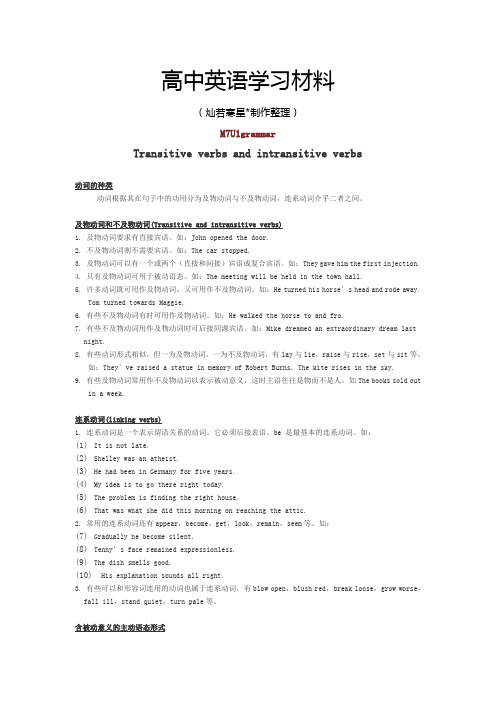
高中英语学习材料(灿若寒星*制作整理)M7U1grammarTransitive verbs and intransitive verbs动词的种类动词根据其在句子中的功用分为及物动词与不及物动词,连系动词介乎二者之间。
及物动词和不及物动词(Transitive and intransitive verbs)1. 及物动词要求有直接宾语。
如:John opened the door.2. 不及物动词则不需要宾语。
如:The car stopped.3. 及物动词可以有一个或两个(直接和间接)宾语或复合宾语。
如:They gave him the first injection.4. 只有及物动词可用于被动语态。
如:The meeting will be held in the town hall.5. 许多动词既可用作及物动词,又可用作不及物动词。
如:He turned his horse’s head and rode away.Tom turned towards Maggie.6. 有些不及物动词有时可用作及物动词。
如:He walked the horse to and fro.7. 有些不及物动词用作及物动词时可后接同源宾语。
如:Mike dreamed an extraordinary dream lastnight.8. 有些动词形式相似,但一为及物动词,一为不及物动词,有lay与lie,raise与rise,set与sit等。
如:They’ve raised a statue in memory of Robert Burns. The kite rises in the sky.9. 有些及物动词常用作不及物动词以表示被动意义,这时主语往往是物而不是人。
如The books sold outin a week.连系动词(linking verbs)1. 连系动词是一个表示谓语关系的动词。
牛津英语模块七-unit-2-Grammar系动词学案
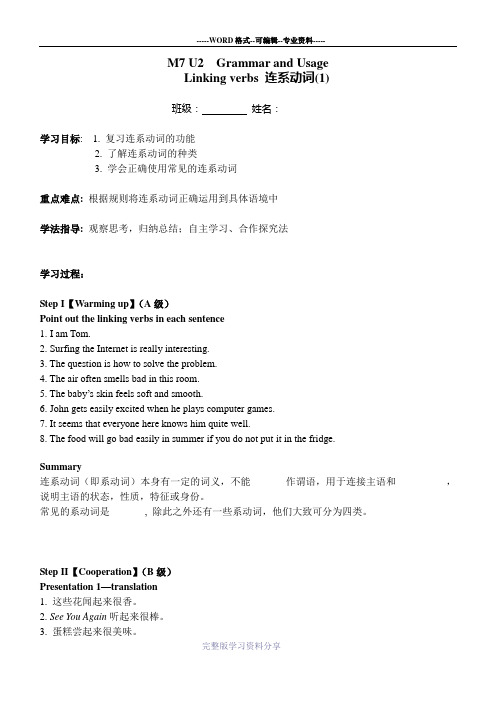
M7 U2 Grammar and UsageLinking verbs 连系动词(1)班级:姓名:____________学习目标: 1. 复习连系动词的功能2. 了解连系动词的种类3. 学会正确使用常见的连系动词重点难点:根据规则将连系动词正确运用到具体语境中学法指导: 观察思考,归纳总结;自主学习、合作探究法学习过程:Step I【Warming up】(A级)Point out the linking verbs in each sentence1. I am Tom.2. Surfing the Internet is really interesting.3. The question is how to solve the problem.4. The air often smells bad in this room.5. The baby’s skin feels soft and smooth.6. John gets easily excited when he plays computer games.7. It seems that everyone here knows him quite well.8. The food will go bad easily in summer if you do not put it in the fridge.Summary连系动词(即系动词)本身有一定的词义,不能_______作谓语,用于连接主语和__________,说明主语的状态,性质,特征或身份。
常见的系动词是_______, 除此之外还有一些系动词,他们大致可分为四类。
Step II【Cooperation】(B级)Presentation 1—translation1. 这些花闻起来很香。
2. See You Again听起来很棒。
3. 蛋糕尝起来很美味。
4. 冰摸起来很冷。
牛津译林版高中英语选修七高二英语:M7练习U2复习练习
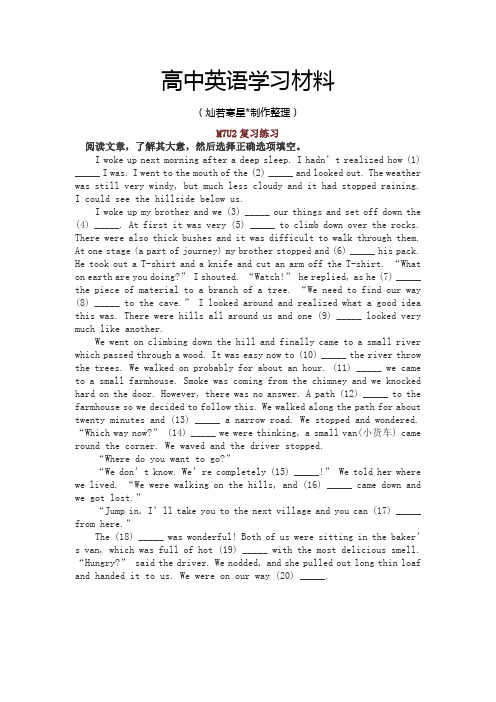
高中英语学习材料(灿若寒星*制作整理)M7U2复习练习阅读文章,了解其大意,然后选择正确选项填空。
I woke up next morning after a deep sleep. I hadn’t realized how (1) _____ I was. I went to the mouth of the (2) _____ and looked out. The weather was still very windy, but much less cloudy and it had stopped raining.I could see the hillside below us.I woke up my brother and we (3) _____ our things and set off down the(4) _____. At first it was very (5) _____ to climb down over the rocks. There were also thick bushes and it was difficult to walk through them. At one stage (a part of journey) my brother stopped and (6) _____ his pack. He took out a T-shirt and a knife and cut an arm off the T-shirt. “What on earth are you doing?” I shouted. “Watch!” he replied, as he (7) _____ the piece of material to a branch of a tree. “We need to find our way (8) _____ to the cave.” I looked around and realized what a good idea this was. There were hills all around us and one (9) _____ looked very much like another.We went on climbing down the hill and finally came to a small river which passed through a wood. It was easy now to (10) _____ the river throw the trees. We walked on probably for about an hour. (11) _____ we came to a small farmhouse. Smoke was coming from the chimney and we knocked hard on the door. However, there was no answer. A path (12) _____ to the farmhouse so we decided to follow this. We walked along the path for about twenty minutes and (13) _____ a narrow road. We stopped and wondered. “Which way now?” (14) _____ we were thinking, a small van(小货车) came round the corner. We waved and the driver stopped.“Where do you want to go?”“We don’t know. We’re completely (15) _____!” We told her where we lived. “We were walking on the hills, and (16) _____ came down and we got lost.”“Jump in, I’ll take you to the next village and you can (17) _____ from here.”The (18) _____ was wonderful! Both of us were sitting in the baker’s van, which was full of hot (19) _____ with the most delicious smell. “Hungry?” said the driver. We nodded, and she pulled out long thin loaf and handed it to us. We were on our way (20) _____.1. A. happy B.sad C.tired D. hungry 2. A. hill B.cave C. farmhouse D. window3. A. collected B.bought C.put D. held 4. A. road B.way C. direction D. held5. A. easy B. wonderful C.interesting D. difficult6. A. threw off B. startedoff C. tookoff D. searched for7. A. tore B.tied C. stuck D. left8. A. out B.back C.away D. off9. A. cave B.tree C.T-shirt D. hill10. A. follow B.cross C.find D. dig 11. A. In the end B.Quickly C.Suddenly D. The moment12. A. led B. setup C. woundup D. put up13. A. found B. cameto C. lookedfor D. discovered14. A. Because B.While C.What D. As soon as15. A. lost B.hungry C.unknown D. puzzled16. A. wind B.rain C.snow D. clouds17. A. arrive B.remember C.understand D. telephone18. A. sight B.journey C.van D. taste19. A. bread B.soup C.water D. coffee20. A. to the farm B. to the cave C. home D. to school答案:1. C 11. A2. B 12. A3. A 13. B4. D 14. B5. D 15. A6. C 16. B7. B 17. D8. B 18. B9. D 19. A10. A 20. C。
- 1、下载文档前请自行甄别文档内容的完整性,平台不提供额外的编辑、内容补充、找答案等附加服务。
- 2、"仅部分预览"的文档,不可在线预览部分如存在完整性等问题,可反馈申请退款(可完整预览的文档不适用该条件!)。
- 3、如文档侵犯您的权益,请联系客服反馈,我们会尽快为您处理(人工客服工作时间:9:00-18:30)。
Guidance and exploration
Task 1:观察并总结: The bamboo chair feels cool. Soon they came to a big hotel that looked very strange. The beer tastes very delicious.
Guidance and exploration
Task 2:完成句子,观察并总结:
to be a most interesting guide. On the long journey, Peter proved ____________ proved (to be) difficult. The search ________________ proved to be The promotion ________________ a turning point in his career. 被动 语态,通常也不用于 ______ 进行 时态。 prove: 作连系动词,无 ______ ' 后来被发现是,最终显现为 ' 意为 ______________________________ , n. / adj. / to be + n /adj , 后可接 _________________________ turn out 意思及用法近似于短语 _________________ 。
whether it works in practice.
A. waits B. stays C. stands D. remains
2. The true author of the book remains _____.
A. know
C. unknown
B. to know
D. knowing
Summary
A. to proved
C. proving
B. proved
D. to prove
解析:stick to: 意为 “坚持,遵守” , prove true 在此处意为 “最终显现为是对的”, prove为主句的谓语动词,采用一般过去时态。 that he had stuck to 为定语从句,修饰先行词 the theory。
小结:连系动词turn之后通常可接表示______________________类的词。
颜色,年龄和时间
翻译:20年后,他变成了一名老师。
Twenty years later, he became a teacher/ he turned teacher. ___________________________________________________________________ 职业 总结:连系动词turn之后亦可接某人后来从事的_____________ , 不接 冠词。 turn接单数名词表职业时,单数名词前_______
got injured John _____________(injure vt) while playing football last Saturday.
偶然的、突发性的、意想不到的 总结:get + 动词的过去分词可表示:___________________________
被动 ________ 动作的结果或状态。
A. be stayed
C. be staying
B. stay
D. have stayed
3. She likes to wear silks because they ________ smooth and soft.
A. feel C. are feeling B. felt D. are felt
Task 3:完成句子,观察并总结: got caught Last night I ________________ in the downpour. Be careful when you cross this very busy street. If not, you get run over / get knocked down (撞翻) by a car. may __________________________________
1. Happy birthday, Alice! So you have ___________ twenty-one already!
A. become B. turned
C. grown D. passed
2. The traffic lights_____ green and I pulled away. A. came B.grew C. went D. got E. turned
某事有待于观察 / 某事有待于去做 。 "remains to be seen / done"“意为_______________________________
填空: remained seated/sitting (remain)there. When I returned, she _________________________
1. To everybody’s great surprise, the fashionable young lady ____ to be a thief. A. found out B. proved out
C. put out
D. turned out
Guidance and exploration
may _________ run over by a car. A. have B. get
C. become D. turn
Guidance and exploration
Task 4:观察并总结:
turn Spring comes, and trees begin to _________ green. is turning grey with the passing of years. Her hair turns/ _________________
Guidance and exploration
Task 5:观察并总结 remains to be seen It _______________________ (see) whether you are right. to be done A lot of work remains _________________ (do). 动词不定式 作表语,常见搭配 总结:连系动词 remain后可接 _____________
1. ----- How are the team playing? ----- They are playing well, but one of them _____ hurt.
A. got
C. are
B. gets
D. were
2. Be careful when you cross this busy street. If not, you
M7 U2 Grammar and usage
exercises---Linking verbs
全品测评卷 P11
Lead-in
1. The cloth that __ smooth and soft __. A. feels; sells well B. feels; is well sold C. is felt; sells well D. is felt; sells good 2. The pilot asked all the passengers on board to remain ___ as the plane was making a landing. A. seat B. seating C. seated D. to be seating
5. This flower smells very sweet.
6. He became mad after that. 7. She grew rich within a short time. 8. The search proved (to be) difficult. II.单项填空:B C A A B A A
变化类系动词 PS: 连系动词无被动语态 ,且通常不用于进行时态中 , 但 ________________ 和feel除外。
turned red. Praised by us, the kid was very shy and his face _________ turns 6 in July. My son _________
They hope the new evidence will prove her innocence.
证明,证实 . 实义动词 使用,意为___________ 当然,prove 亦可充当 ___________
1. The theory that he had stuck
_______ true.
(当我回来时,她仍然坐在那儿)
总结:连系动词remain的用法之一:当表示某人就坐或某人处于坐着的状态 时,通常采用以下两种搭配: 1. ____________________; remain seated
或
2.
remain sitting ___________________ 。
1. It is a good plan in theory, but it _____ to be seen
7. turn 8. tastes 9. turned/became 10. turned
II. 1. smell 2. seemed to be 3. became a/turned 4. got caught
